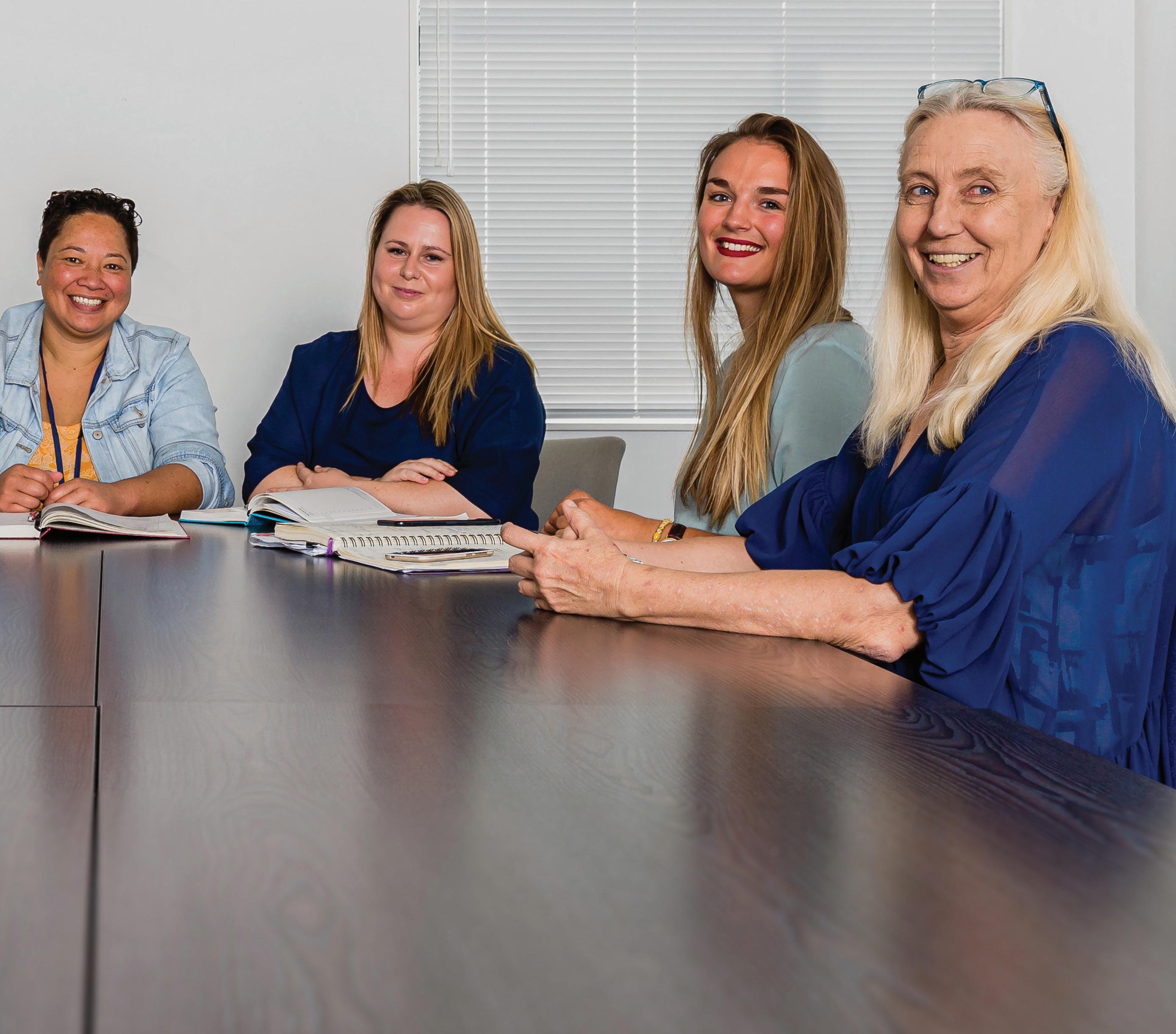
4 minute read
Social Workers in Schools: Support their work by becoming a Family Works Guardian Angel
What defines a good day? A child smiling when they haven’t smiled for months.”
“Seeing a child overjoyed when they’ve been given a pair of shoes, and after they dutifully hand back the ‘try-on’ socks, told that they can keep those as well.”
Advertisement
“Establishing a strong and genuine connection to whānau so you have their trust, so they open their door to you.” The SWiS (Social Workers in Schools) team at PSEC, or SWiSSies as they’re often known, are a tight, supportive team.
The Government contracts PSEC to provide nine fulltime SWiS in the region working in partnership with school staff. They’re spread thinly across Hawke’s Bay schools, and demand for their services is high. Scheduling an hour-long photo session for this issue of the PSEC magazine was an exercise in logistics, but today the room is filled with energy and affection as the team reunite.
“The closeness of the team, our support of each other – it’s one of the huge positives in this job,” says Lynair Bergman, Clinical Team Leader. The team work with children who may be referred to them by the school or by other agencies, but their work is not confined to the school setting. It usually — necessarily —extends to the wider whānau. Park School in Hastings, where SWiS Suzanne van der Gouw is based.
"There are three vital connectors — the school, the whānau, and the SWiSsie," says Kate. "The key is everyone working alongside, working with each other rather than working for." The nationwide SWiS initiative was originally set up as an early intervention and prevention service with SWiS providing much-needed lower level support, but the reality is they’re now more often providing crisis support. Demand has never been higher, but the system is overstretched and under-resourced, and services to which the team could theoretically refer these kids, mental health for example, are at capacity themselves. “The thing is, we don’t want principals to hold back from referring kids to us because they’re aware of our workload. We want to know about every child that needs SWiS,” says Lynair. “Hawke’s Bay has high rates of family violence and drug use. The cost of
Children and their whānau
in
Hawke’s Bay schools
GOOD DAYS AND GUMBOOTS
GOOD DAYS AND GUMBOOTS


housing is an absolutely huge issue. Transience is another; kids lose roughly a term’s progress every time they change schools, and we see that happen a lot." Kate agrees: "Our kids' lives are far more challenging than they've ever been." One simple step for moving forward with a family is relieving practical pressures; providing food parcels, shoes, jackets, lunchboxes, even beds. “We had one boy who gave his bed to his baby sister and slept on a tarp on the floor. We were able to find him a second-hand bed, something that seems a basic need to us but can be a huge challenge to a family in poverty.” How does a family end up unable to afford a bed for a child? There’s never just one issue. When a SWiS meets with a family about their child, they work together to unpack the situation. The parents may have lost their jobs. This may result in mental health problems, which can lead to drug and alcohol misuse, possibly violence. The child becomes a small distress beacon signalling their home situation at school every day, and SWiSsies, working with principals and teachers, look out for and respond to those signs. “For some kids – the high-risk kids – school might represent the 30 hours a week when they are safe.” Lynair recalls one little boy asking her if she had any shoes, so she asked to look at his. They were gumboots with the back heels cut out so his growing feet could fit. He got new shoes that day. “Yes, there are big challenges, but we wouldn’t be doing this work if we weren’t passionate about it,” she says. “It starts with the kids, of course. Spending time with them, nonjudgmental time one-on-one when they won’t get into trouble, when they can tell us anything they like and it’s OK. Notching up steps towards a goal we’ve set with them and their whānau, looking back together and seeing how far we’ve come. for their family. As a team, always being here for each other and our families.
That’s the stuff you can’t put value on.”
Become a Family Works Guardian Angel
Be a vital part of our work with local at-risk children and families by becoming a Family Works Guardian Angel.
As one of our Angels, you'll make a monthly contribution of your choice to Family Works and receive updates on how we put your donation to good use in the community. To find out more:
angel@psec.org.nz
psec.org.nz/guardian-angel
Donate today, or tick the Family Works Guardian Angel box on the enclosed donation form to find out more about regular giving.






